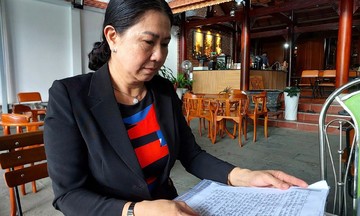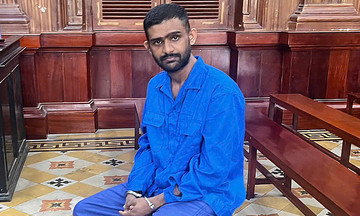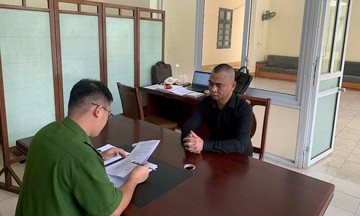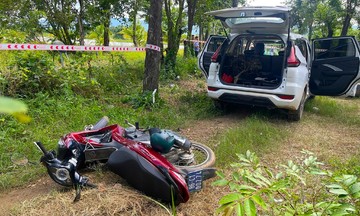This is a new regulation stipulated by the Ministry of Public Security in Circular 66/2025, which outlines the supervision of restraining orders as prescribed by the Law on Domestic Violence Prevention and Control. The circular takes effect today, 4/9.
The Law on Domestic Violence Prevention and Control mentions 10 measures to prevent domestic violence and protect and support victims, including "no-contact orders." This measure prohibits individuals who have engaged in domestic violence from approaching the victim or using any means or tools to perpetuate violence.
No-contact orders can be issued by the chairperson of the Commune People's Committee (CPC) or the court upon request from the victim, guardian, or competent authorities, or when the domestic violence is deemed life-threatening to the victim. The order lasts 3-4 days and terminates when deemed unnecessary or at the victim's or guardian's request.
Commune police are required to assign surveillance personnel within one hour of receiving a no-contact order. The Law stipulates that upon receiving the order, commune-level police must preside over and coordinate with village heads, residential group leaders, and relevant local organizations to oversee and assign surveillance personnel.
Circular 66 directs that immediately after receiving a no-contact order from the CPC or court, the head of the commune police must, within one hour, issue a decision assigning surveillance personnel and a surveillance plan. Previous drafts proposed timeframes from 6 hours to 3 days, but the final circular mandates one hour to ensure timely victim protection and support.
The head of the commune police must also promptly assign personnel for surveillance using the fastest means available and immediately contact village heads, residential group leaders, and local security forces to coordinate this effort.
Within one hour of the surveillance assignment decision, commune police must convene a meeting to announce the surveillance implementation. Attendees include the monitored individual and their family, the victim and their family, village heads, residential group leaders, local security forces at the residences of both parties, and the assigned surveillance personnel.
At this meeting, the commune police will disseminate information about the no-contact order's contents, introduce the surveillance personnel, and outline the responsibilities of involved individuals (family members, residential group leaders, etc.).
The assigned surveillance personnel must be reputable community members with good morals, suitable conditions, and the ability to perform their duties voluntarily, according to the circular.
Potential candidates include residential group leaders, village heads, members of local security teams, members of the Fatherland Front, members or executive committees of the Women's Union at the commune level, members of apartment or collective housing management boards, and other respected community members.
Surveillance personnel can immediately implement no-contact monitoring measures based on existing conditions and circumstances. During surveillance, they must not only ensure the perpetrator doesn't approach the victim but also inform them of their right to legal education on topics such as: Recognizing domestic violence and the perpetrator's responsibilities; Conflict resolution and prevention skills; Knowledge and skills for controlling violent behavior; Stress management techniques, etc.
Individuals subject to no-contact orders must sign a commitment to strictly comply with the order, fulfill their civic duties, and earnestly rectify their wrongdoing. They must also participate in education and behavior modification programs and engage in community service as directed by the CPC, such as planting and caring for trees in public areas or cleaning and repairing village roads, alleys, streets, cultural houses, community centers, or other public facilities.
During the surveillance period, any breach of obligations or signs of legal violations may lead to a summons by the head of the commune police. Depending on the nature and severity of the violation, individuals may face disciplinary action, administrative penalties, or even criminal prosecution. If damages occur, compensation is required by law.
Families of monitored individuals are also responsible for cooperating, encouraging, and implementing measures to manage, educate, and support their compliance with the law, fulfillment of obligations, and commitment to correcting their behavior.
Victims are entitled to temporary shelter arranged by the chairperson of the CPC or through voluntary support from agencies, organizations, or individuals, as stipulated by the Law on Domestic Violence Prevention and Control. They will also receive essential support under social assistance laws.
A 2023 report by the Ministry of Labor, Invalids and Social Affairs revealed over 3,100 households and more than 3,200 domestic violence cases in Vietnam (compared to over 4,400 cases in 2022). Physical violence was most prevalent with 1,520 cases, followed by emotional violence (1,400 cases), economic violence (230 cases), and sexual violence (110 cases).
Of the nearly 3,200 victims, 2,600 were women and 565 were men (17.7%). While both the number of cases and victims decreased compared to 2022, the proportion of male victims increased. Nearly 3,000 perpetrators received feedback and criticism, administrative penalties, and 129 faced criminal prosecution.
Most victims only report and seek assistance from authorities when incidents are severe, prolonged, or potentially lead to marriage dissolution. This hinders data collection and the implementation of intervention and response strategies.
Therefore, according to the Ministry of Public Security, effective surveillance is crucial for enforcing no-contact orders. It helps prevent recurring violence, directly protects victims' lives and well-being, ensures strict law enforcement, and contributes to a safe and healthy family environment. Effective surveillance plays a vital role in combating domestic violence and fostering a civilized and safe society.
Globally, the US is known for its widespread use of restraining orders, averaging 7.7 orders per 1,000 adults. While other laws vary by state, restraining orders are consistently prioritized.
All states, territories, and tribal lands are required to recognize and enforce protection orders legally issued in other states. This means if a woman obtains a protection order against her former husband in California and moves to Texas, Texas law enforcement must treat it as if it were issued by a Texas court.
Thanks to the "Full Faith and Credit" principle, victims don't need new orders when moving between states, ensuring continuous protection and avoiding legal loopholes due to interstate legal differences.
Restraining orders range from emergency (up to 10 days) and temporary (up to 30 days) to long-term, which can last two or five years depending on the state, or even indefinitely in Nevada, New Hampshire, and New Jersey.
US restraining orders are typically detailed, potentially including: Prohibitions on direct or indirect contact (calls, texts, emails, social media); Restrictions on approaching the victim within a specific distance (100-200 m); Bans from the victim's workplace, school, or home; Mandatory surrender of weapons to police; Requirements for the subject to leave the shared residence (even if jointly named on the lease or deed), etc.
In Japan, perpetrators can also be prohibited from contacting the victim's relatives. Orders apply not only to married couples but also to cohabiting couples and divorced individuals. Protection and no-contact orders can last 6-12 months. Since 4/2024, penalties for violations have doubled to up to two years imprisonment or a fine of up to two million yen (previously one year or one million yen, equivalent to 180 million dong).
Hai Thu












